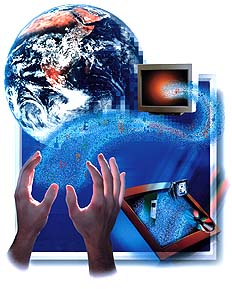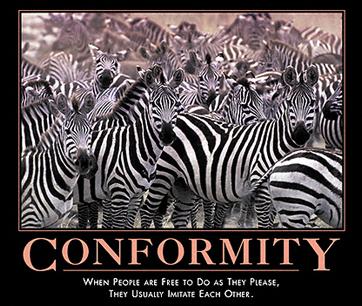Will You Have Fries with
Your Metaphysics?
By Doug Mann,
University of Western Ontario
 Universities
have undergone a subtle yet profound shift over the last few decades, a shift
that has brought them closer to the consumer economy and to our overly
therapeutic culture, thereby undermining the foundations of higher learning.
There are a number of names for this process, but the best is probably
McDonaldization, coined by the American sociologist George Ritzer. This is the
process where a social or political institution adopts the methods of McDonald’s
and other fast-food outlets: efficiency, a standardized product, a high
turnover, a phony intimacy between buyer and seller (“Hi! My name’s Jennifer!
How can I serve you today?”), and the notion that the customer is always right
(or at least that’s what we want them to think). More and more our schools have
become Fast Food U’s, McVersities eager to enter the service sector, with
students as customers, teachers as servers, and administrators as franchise
managers.
Universities
have undergone a subtle yet profound shift over the last few decades, a shift
that has brought them closer to the consumer economy and to our overly
therapeutic culture, thereby undermining the foundations of higher learning.
There are a number of names for this process, but the best is probably
McDonaldization, coined by the American sociologist George Ritzer. This is the
process where a social or political institution adopts the methods of McDonald’s
and other fast-food outlets: efficiency, a standardized product, a high
turnover, a phony intimacy between buyer and seller (“Hi! My name’s Jennifer!
How can I serve you today?”), and the notion that the customer is always right
(or at least that’s what we want them to think). More and more our schools have
become Fast Food U’s, McVersities eager to enter the service sector, with
students as customers, teachers as servers, and administrators as franchise
managers.
The overall atmosphere today in institutions
of higher learning, as compared to a generation ago, is one of high technology,
corporate connectivity, self-indulgence and a therapeutic approach to teaching
by professors and course and discipline-choice by students. Yet as Stanley Fish
says in his article in the February 4 edition of the Chronicle of Higher
Education on a similar theme, if professors are expected to be therapists,
then they’re practicing without a license or formal training.
Starting in the late 1960s, students began
to have more and more choice of which courses they could take, to the point
where university calendars wind up looking like very complex menus from which
the student can choose a variety of intellectual delicacies – an appetizer of
introduction to psychology, a delicious bowl of astronomy, a main course of
metaphysics, and a cherry-topped desert of criminology. The dark side of this is
the fact that undergraduate students are woefully ignorant of the basic facts of
world history, national politics, or the great works of literature, unless they
happen to stumble on them by being a history, political science, or literature
major.
Added to the menu-approach to course
selection is another innovation from the fast-food sector, the complaint card.
In universities these are called “student evaluations,” and have become a
compulsory end-of-term ritual in most schools. They usually consist of a series
of about 10-15 questions on whether the student in question was satisfied with
his or her intellectual meal. Some of the questions are innocuous enough, like
“Were assignments graded promptly?” or “Did the professor follow the course
outline?” But some other questions (taken from an actual evaluation) enter the
legendary Land of Mental Fuzz: “Was the professor’s presentation interesting?”,
“Did the professor show concern?”, and “Was the professor a good motivator?” In
other words, “Did this class make you feel good about yourself?” This is a
question for pop psychology, not educators.
One quick and easy reform of this system is
to ask students to sign their evaluations, thus taking responsibility for their
mean and spiteful comments about a professor’s personality, dress choices, or
general physical appearance. Then ask them to answer a few tough questions about
their own intellectual habits: “Did you come to more than 50% of lectures?” “Did
you buy the textbook and read it?” “Are your negative comments motivated by
feelings of revenge for getting a low grade in the class?” If they don’t answer
these questions fairly, or don’t sign the evaluation, then send it to the
shredder!
 It
wasn’t so long ago that if a student couldn’t pay attention in class, they would
fail their exams and have to repeat the course. Under the pervasive influence of
the seductive sounds and images of mass culture – television, music videos,
omnipresent pop music piped directly into the brain via I-Pods and similar
devices, not to mention the infernally eternal linkages links provided by cell
phones and the Internet – more and more young people fall prey to Attention
Deficit Disorder and its psycho-cousins. Now inattentive Andy or Amanda gets a
note from a special office to give them all the time they need to write exams,
an indulgence they won’t get once the hallowed halls of academe are left behind.
It
wasn’t so long ago that if a student couldn’t pay attention in class, they would
fail their exams and have to repeat the course. Under the pervasive influence of
the seductive sounds and images of mass culture – television, music videos,
omnipresent pop music piped directly into the brain via I-Pods and similar
devices, not to mention the infernally eternal linkages links provided by cell
phones and the Internet – more and more young people fall prey to Attention
Deficit Disorder and its psycho-cousins. Now inattentive Andy or Amanda gets a
note from a special office to give them all the time they need to write exams,
an indulgence they won’t get once the hallowed halls of academe are left behind.
In addition, universities have liberal
add/drop deadlines and other policies designed to accommodate students’
indecision, mark obsession, or laziness. For example, at Western one can wait
until November 30 to drop a full-year course: students will demand first-term
tests back before the drop date so they can ditch the course if their grades are
too low for their tastes. Whether the course material is important or
interesting is a secondary concern.
A true story: a couple of years ago a
student of mine showed up at the end of the very last class in April asking to
make up a mid-term test written in February he had missed. When I said it was
too late, he stormed out of the classroom fuming, kicking a garbage can as he
left because I had had the temerity to demand that he actually contact me within
a month of missing the only term work he had to do in the course! The moral of
the story is simple: students see courses and professors as part of an
intellectual service industry which they feel free to complain about and abuse
if the service isn’t up to their exacting standards – standards which, of
course, most of them could never live up to themselves.
And the classroom conversations in the
McVersity have lost their edge. Most students today have a pathological fear of
disagreeing with each other, even in ethics, political issues and social theory
classes. Popularity vetoes intellectual debate. They would far rather treat
irreconcilable claims as “just opinions” than exercise critical thought and
attack each other’s ideas. As Alan Bloom hinted in his 1988 The Closing of
the American Mind, a fog of soft relativism has settled over higher
education which obscures real differences in values and interpretations with the
sweet delight of the notion that everyone could, indeed, be right about pretty
well everything (outside of hard science). Where’s Herbert Marcuse when you need
him?
Mark inflation and workload deflation are
two more characteristics of the McVersity. The modern student is obsessed with
grades, and all too often treats a B, a once respectable mark, as a failure. A
large minority of students find reading classical literature and theoretical
texts next to impossible, preferring pre-digested accounts in textbooks or
point-form summaries e-mailed to them by their professors. I remember as clearly
as if it were yesterday reading through Plato’s Republic, Thomas Hobbes’
Leviathan, and hundreds of pages of Marx and Engels in an undergraduate
political theory class. Now such a class is likely to be taught from a textbook
containing bite-size bits of these great works, or from an entirely secondary
source containing but a whiff of the original classics. It’s not in the least
strange for a sociology undergraduate to get their BA without having read a
single social theory classic from cover to cover. Yet we shouldn’t be too hard
on the students themselves: we live in a therapeutic culture where most people
think that feeling good is more important than critical thought or hard work.
 Technology
only serves to hasten the McDonaldization process. Over the last decade the
computer has brought many changes in the way schools are administered, courses
are taught, and teachers and students communicate. At Western students can log
on to the registrar’s page and add and drop courses at will up to a certain date
each term – they don’t even have to talk to counselors or professors about the
content of their courses. Professors are more and more pressured to use glitzy
Power Point presentations instead of the once cutting-edge overhead projector or
the unadorned spoken word. And worst of all, the de facto norm for
teacher/student (and probably student/student) communication has become e-mail.
It’s not unusual for a student to ask a professor via e-mail to spend an hour
detailing the key elements of a missed lecture or describing an assignment which
is already described in the course outline rather than getting off their duffs
and coming to the professor’s office for a much shorter and probably more
informative chat. Added to the sense of isolation and alienation that e-mail
promotes, some students now feel free to flame their TAs and lecturers over
e-mail if they didn’t get the mark they think they deserved or the professor
refuses an essay extension. The computer has created a whole new realm of
rudeness that once again pushes the university closer to the mentality of the
service economy.
Technology
only serves to hasten the McDonaldization process. Over the last decade the
computer has brought many changes in the way schools are administered, courses
are taught, and teachers and students communicate. At Western students can log
on to the registrar’s page and add and drop courses at will up to a certain date
each term – they don’t even have to talk to counselors or professors about the
content of their courses. Professors are more and more pressured to use glitzy
Power Point presentations instead of the once cutting-edge overhead projector or
the unadorned spoken word. And worst of all, the de facto norm for
teacher/student (and probably student/student) communication has become e-mail.
It’s not unusual for a student to ask a professor via e-mail to spend an hour
detailing the key elements of a missed lecture or describing an assignment which
is already described in the course outline rather than getting off their duffs
and coming to the professor’s office for a much shorter and probably more
informative chat. Added to the sense of isolation and alienation that e-mail
promotes, some students now feel free to flame their TAs and lecturers over
e-mail if they didn’t get the mark they think they deserved or the professor
refuses an essay extension. The computer has created a whole new realm of
rudeness that once again pushes the university closer to the mentality of the
service economy.
Canadian universities comply all too easily
with the modus operandi of the fast-food economy. More and more they hire
part-time teachers who work on course-by-course contracts, to the point where
it’s not unusual at some schools for half of all first- and second-year courses
to be taught by graduate students or part-timers with no long-term stake in the
institution they work for. Universities treat a large group of their employees
like fast-food chains treat their own workers: as a cheap and disposable work
force which requires little training, and can be turned over completely each
year or two at the whim of administrators or departmental chairs.
 And when they do hire new faculty into
full-time positions, they’re often slick young things from south of the border
whose lack of experience at teaching and publishing is made up for (or so the
ideology goes) by youthful enthusiasm, just like all those bubbly teens behind
the counter at your friendly neighborhood burger joint.
And when they do hire new faculty into
full-time positions, they’re often slick young things from south of the border
whose lack of experience at teaching and publishing is made up for (or so the
ideology goes) by youthful enthusiasm, just like all those bubbly teens behind
the counter at your friendly neighborhood burger joint.
And on a deeper level, universities have
more and more emphasized the skills required by the corporate economy when
allocating their dwindling funds to hiring and research. Venerable disciplines
are trying to make themselves relevant to the globalized economy, like
youth-obsessed septuagenarians listening to hip hop and wearing belly rings:
Philosophy departments teach critical thinking, English departments writing,
Sociology departments statistics, etc. The core of the old liberal education in
the arts and sciences is being eroded by a corporatist surrender to the notion
that university degrees are nothing more than tickets to a good job and thus
more money - if you ask students if this is true, as I have in at least a half
dozen different classes over the last few years, the large majority readily
admit it. Wither is fled the visionary gleam? Into suburbia, driven there by an
SUV with a television bolted to the roof to keep the kids happy during those
long, agonizing drives home.
When they starting asking me to wear a
button bearing a bright yellow happy face and a baseball cap with the
university’s logo on it, I’ll know it’s time to quit.
Doug Mann teaches in several departments
at the University of Western Ontario in
London, Ontario.
 Universities
have undergone a subtle yet profound shift over the last few decades, a shift
that has brought them closer to the consumer economy and to our overly
therapeutic culture, thereby undermining the foundations of higher learning.
There are a number of names for this process, but the best is probably
McDonaldization, coined by the American sociologist George Ritzer. This is the
process where a social or political institution adopts the methods of McDonald’s
and other fast-food outlets: efficiency, a standardized product, a high
turnover, a phony intimacy between buyer and seller (“Hi! My name’s Jennifer!
How can I serve you today?”), and the notion that the customer is always right
(or at least that’s what we want them to think). More and more our schools have
become Fast Food U’s, McVersities eager to enter the service sector, with
students as customers, teachers as servers, and administrators as franchise
managers.
Universities
have undergone a subtle yet profound shift over the last few decades, a shift
that has brought them closer to the consumer economy and to our overly
therapeutic culture, thereby undermining the foundations of higher learning.
There are a number of names for this process, but the best is probably
McDonaldization, coined by the American sociologist George Ritzer. This is the
process where a social or political institution adopts the methods of McDonald’s
and other fast-food outlets: efficiency, a standardized product, a high
turnover, a phony intimacy between buyer and seller (“Hi! My name’s Jennifer!
How can I serve you today?”), and the notion that the customer is always right
(or at least that’s what we want them to think). More and more our schools have
become Fast Food U’s, McVersities eager to enter the service sector, with
students as customers, teachers as servers, and administrators as franchise
managers.  It
wasn’t so long ago that if a student couldn’t pay attention in class, they would
fail their exams and have to repeat the course. Under the pervasive influence of
the seductive sounds and images of mass culture – television, music videos,
omnipresent pop music piped directly into the brain via I-Pods and similar
devices, not to mention the infernally eternal linkages links provided by cell
phones and the Internet – more and more young people fall prey to Attention
Deficit Disorder and its psycho-cousins. Now inattentive Andy or Amanda gets a
note from a special office to give them all the time they need to write exams,
an indulgence they won’t get once the hallowed halls of academe are left behind.
It
wasn’t so long ago that if a student couldn’t pay attention in class, they would
fail their exams and have to repeat the course. Under the pervasive influence of
the seductive sounds and images of mass culture – television, music videos,
omnipresent pop music piped directly into the brain via I-Pods and similar
devices, not to mention the infernally eternal linkages links provided by cell
phones and the Internet – more and more young people fall prey to Attention
Deficit Disorder and its psycho-cousins. Now inattentive Andy or Amanda gets a
note from a special office to give them all the time they need to write exams,
an indulgence they won’t get once the hallowed halls of academe are left behind. Technology
only serves to hasten the McDonaldization process. Over the last decade the
computer has brought many changes in the way schools are administered, courses
are taught, and teachers and students communicate. At Western students can log
on to the registrar’s page and add and drop courses at will up to a certain date
each term – they don’t even have to talk to counselors or professors about the
content of their courses. Professors are more and more pressured to use glitzy
Power Point presentations instead of the once cutting-edge overhead projector or
the unadorned spoken word. And worst of all, the de facto norm for
teacher/student (and probably student/student) communication has become e-mail.
It’s not unusual for a student to ask a professor via e-mail to spend an hour
detailing the key elements of a missed lecture or describing an assignment which
is already described in the course outline rather than getting off their duffs
and coming to the professor’s office for a much shorter and probably more
informative chat. Added to the sense of isolation and alienation that e-mail
promotes, some students now feel free to flame their TAs and lecturers over
e-mail if they didn’t get the mark they think they deserved or the professor
refuses an essay extension. The computer has created a whole new realm of
rudeness that once again pushes the university closer to the mentality of the
service economy.
Technology
only serves to hasten the McDonaldization process. Over the last decade the
computer has brought many changes in the way schools are administered, courses
are taught, and teachers and students communicate. At Western students can log
on to the registrar’s page and add and drop courses at will up to a certain date
each term – they don’t even have to talk to counselors or professors about the
content of their courses. Professors are more and more pressured to use glitzy
Power Point presentations instead of the once cutting-edge overhead projector or
the unadorned spoken word. And worst of all, the de facto norm for
teacher/student (and probably student/student) communication has become e-mail.
It’s not unusual for a student to ask a professor via e-mail to spend an hour
detailing the key elements of a missed lecture or describing an assignment which
is already described in the course outline rather than getting off their duffs
and coming to the professor’s office for a much shorter and probably more
informative chat. Added to the sense of isolation and alienation that e-mail
promotes, some students now feel free to flame their TAs and lecturers over
e-mail if they didn’t get the mark they think they deserved or the professor
refuses an essay extension. The computer has created a whole new realm of
rudeness that once again pushes the university closer to the mentality of the
service economy.  And when they do hire new faculty into
full-time positions, they’re often slick young things from south of the border
whose lack of experience at teaching and publishing is made up for (or so the
ideology goes) by youthful enthusiasm, just like all those bubbly teens behind
the counter at your friendly neighborhood burger joint.
And when they do hire new faculty into
full-time positions, they’re often slick young things from south of the border
whose lack of experience at teaching and publishing is made up for (or so the
ideology goes) by youthful enthusiasm, just like all those bubbly teens behind
the counter at your friendly neighborhood burger joint.